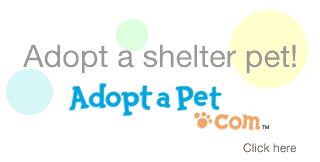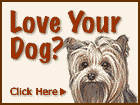Here's a great article that I thought I would pass on...hope you find it interesting! –Kim
The Food Bowl is a Potential Danger Area
When I am in any social setting and I am asked "What do you do?" my response always turns the conversation to dogs. Someone always volunteers a lot of information about their dog or past dogs. I usually enjoy that since I love all things dog. However, I am often reminded of the many misconceptions people have about their pets.
One of the most common ones I hear is: "Everyone knows you can't go near dog when he is eating." I usually say something neutral like, "Well, it could be dangerous with some dogs, it all depends." But such conversations leave me a bit concerned.
The truth is: there is no reason at all you shouldn't be able to approach your dog's food dish while he is eating. In fact, there is no reason you shouldn't be able to take food from your dog's mouth if you want to. I try not to think about how many people are injured each year because someone allowed food aggression from their dog because they thought it was "normal." Food aggression may be normal, but it is not acceptable. Responsible dog ownership requires that we fix this problem, and we fix it right.
I try not to think about how many people are injured each year because someone allowed food aggression from their dog because they thought it was "normal." Food aggression may be normal, but it is not acceptable. Responsible dog ownership requires that we fix this problem, and we fix it right.
There are many ways to deal with food aggression but for most dogs it begins with building the right relationship. A good leadership program is a great place to start as is a good obedience program.
 Let me also say that we should be respectful of our dog's space at all times. That doesn't mean we let him dictate how and when we touch him, or let him tell us we can't be near his bowl. But we need to be aware of what our dogs are telling us, and respond in a manner that is respectful if not compliant.
Let me also say that we should be respectful of our dog's space at all times. That doesn't mean we let him dictate how and when we touch him, or let him tell us we can't be near his bowl. But we need to be aware of what our dogs are telling us, and respond in a manner that is respectful if not compliant.
Until trust is established, the food bowl is a potential danger area, and the last thing we want is to start a fight over the food. As always, in Chicago dog training, we want to set the dog up for success, not failure. We don't want to push the issue in a way that is push the dog towards aggression. Once the situation escalates into violence, everything becomes much more complex. So we don't want to just rush up on the food bowl and insist that the dog accept our presence. That might work, but it might backfire. Better to be safe.
I like to begin by calling the dog away from the food bowl. A 10 or 15 foot line might be in order to help teach this behavior. I will call the dog's name and apply some gentle leash pressure pulling the dog towards me. As soon as he starts to come my way (by his own choice) I let the leash go slack and continue to encourage the dog. When he gets to me I will have an incredibly tasty treat waiting for him. So he learns that giving something up for me often means he gets something better. In other words, he isn't giving anything up, he's simply trading up!
When the dog is readily coming away from the dish to be with me, I will move to the next step. I will begin approaching the dog while he is eating. When he looks up at me, I will call him as I did before, using the leash gently – if necessary – and giving him a tidbit when he does.
From there, I move right next to the dog while he is eating. If he looks up curiously, I will give him the tidbit and allow him to go right back to eating. If he growls or snarls, I will take his leash and walk him away from the food for a bit. We can try again later. I never yell, or threaten we just go away from the food.
Next we apply the same principle to touching the dog while he eats, and finally, we will take his food away.
This process may take a few minutes, or a few weeks depending on how deeply rooted the behavior is, but the principles don't change.
What I don't do is just as important as what I do. I don't stick my hand in the bowl every meal and constantly play with the food while the dog is trying to eat. I don't snatch the bowl away randomly over and over again during the meal. I don't poke and prod the dog while he is eating. Any of these human behaviors can accidentally create food aggression. If you and I go out to eat together, there are only so many times I'll let you play with my French fries before I stab you with a fork!
Be consistent and fair, and there is no reason you have to worry about someone approaching your dog while he is eating. On the other hand, if your dog is growling at you because of food aggression, please call for help right now. A good dog trainer can help turn that problem around so you'll have a good dog who will let you near his food.
 The author, Marc Goldberg, is a dog trainer specializing in the rehabilitation of difficult dogs and improving relationships. He is Vice President of the International Association of Canine Professionals (IACP) and Editor of SafeHands Journal. The author also educates professional dog trainers in his techniques. Visit him on the Web at http://www.chicagodogtrainer.com or http://www.dogtraininginchicago.com.
The author, Marc Goldberg, is a dog trainer specializing in the rehabilitation of difficult dogs and improving relationships. He is Vice President of the International Association of Canine Professionals (IACP) and Editor of SafeHands Journal. The author also educates professional dog trainers in his techniques. Visit him on the Web at http://www.chicagodogtrainer.com or http://www.dogtraininginchicago.com.© Marc Goldberg





































